- Abby Distler, Patient Experience Manager, Capital Region Medical Center
- Amber Lashley, Patient Experience Coach, University of Missouri Health Care
- Amy Camp, Patient/Family PFAC Member Representative, University of Missouri
- Amy McLean, NICU Family Support Manager, Mercy Hospital St. Louis
- Brandi Weltz, BSHCA, Patient Experience Coordinator, Citizens Memorial Hospital
- Carlos Martinz, Director of Patient Experience, Phelps Health
- Celia McGraw, Manager of Care Redesign, Mercy Health
- Charles Deubner, Patient and Family Advisor
- DeeJo Miller, Patient and Family Engagement Program Manager/Patient Advocate, Children’s Mercy Kansas City
- Elizabeth (Liz) Kruvand, Patient Experience Specialist, SSM Health Cardinal Glennon Children’s Hospital
- Jen Carron, Patient Experience Officer, BJC Health System
- Jolie Smith, Patient Advocate
- Kaylyn Winegar, Patient Experience Manager, UnitedHealthcare
- Kevin Wake, PFAC Chairman, University Health
- Kristin Repp, Pharm.D., BCPS Director of Population Health, Saint Luke’s Health System
- Lauren McGinnis, Patient Experience Manager, Missouri Baptist Medical Center
- Laurie Hines; Patient, Caregiver Advocate; University of Missouri
- Margaret Stone, Population Health Analyst, Saint Luke’s Health System
- Maureen McGuire, Patient Advocate
- Michelle Baltzell, Patient Experience Coordinator, Southeast Health
- Mirae Bunnell, Patient Advocate
- Patti Bradley, Sr. Director of Patient Experience, North Kansas City Hospital
- Shaunda Hawkins, Patient Advocate, Liberty Hospital
- Sheryl Chadwick, Patient and Family Engagement Program Manager/Patient Advocate, Children’s Mercy Kansas City

Patient Family Advisory Council
Formed in 2017, the MHA statewide PFAC is comprised of patients, family members, patient advocates, hospital staff and providers in Missouri.
One of only a handful of state-level councils in the nation, MHA’s PFAC is focused on increasing the role of patients and family members to improve health care delivery, health outcomes and reignite joy in work through improved patient-provider relationships.
Recognized as a CMS priority focus area in 2018, MHA’s statewide PFAC serves to provide leadership and support to advocate for the sustainable integration of patient and family engagement across the care continuum in Missouri to achieve the Quadruple Aim.
Priorities
Key Outcome Objectives
- We will ensure the council remains comprised of patients, family members, hospital staff and community leaders from across the state.
- We will serve to inform broader health care initiatives and policy from a patient and family perspective.
- We will aim to promote a statewide culture of health, integrating the patient and family perspective.
- We will provide a consumer voice that is critical to achieving the Triple Aim of better health, better care and lower costs.
- We will provide resources, support and expertise to meet these objectives.
Council Action Items
The council’s goal is to complete the following actions in the first three years of formation.
- Action 1: Identify metrics to evaluate statewide progress and to base supportive programming, resources and tools that raise awareness of the patient and family perspective.
- Action 2: Inform, at a state level, common themes and issues that detract from the health care experience; provide insight and feedback for interventions.
- Action 3: Collaborate with MHA on development of strategies and resources and support dissemination of these across the state
- Action 4: Serve as mentors and liaisons to members developing internal PFACs
- Action 5: Assist in understanding and deployment of health literacy and disparity reduction initiatives
Membership
To join the MHA PFAC, fill out the membership application. If you have questions, contact Jessica Stultz at jstultz@mhanet.com.
Compass Honor
Sponsored by the Statewide Patient and Family Advisory Council, MHA introduced an annual recognition, the Compass Honor, which recognizes a Missouri hospital for outstanding efforts in effectively partnering with their PFAC. Through public recognition, this honor will encourage and inspire hospitals to adopt practices, learn collectively and improve their PFACs.
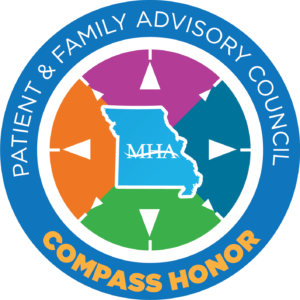
The “compass” in Compass Honor signifies that with each direction we turn, we find partners in care.
- North symbolizes patients as our true north.
- South symbolizes caregivers and family.
- East symbolizes health care providers.
- West symbolizes support staff.
Harrison County Community Hospital
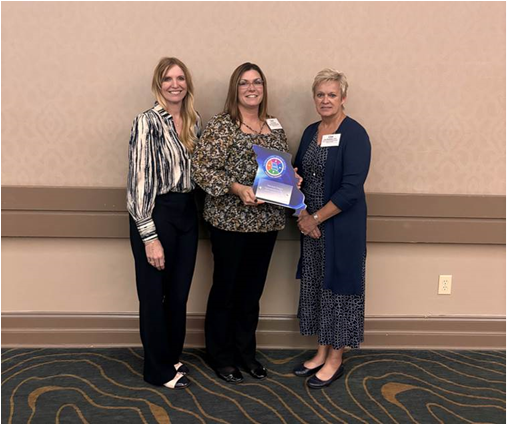
Harrison County Community Hospital received the Compass Honor for a hospital with fewer than 100 beds.
Since the hospital PFAC’s initial meeting in January 2024, members have offered input on many initiatives such as renovating a waiting room, streamlining discharge paperwork, expanding community health fair offerings and improving accessibility options during registration.
“Our Patient and Family Advisory Council is pivotal in transforming our acute appointment scheduling and waiting room experiences,” said Tara Sherer, CNA, PFAC Chair and Director of In-Home Services and Registration at Harrison County Community Hospital. “By prioritizing innovations like negative air systems, enhanced registration options for those who are hard of hearing and thoughtful accessibility measures, we’re not just improving logistics — we’re fostering an environment where every patient feels safe, heard and valued. Together, we’re redefining care for a healthier tomorrow.”
Additionally, the council supported a telehealth grant, served as “secret shoppers” for infection control, assisted with tracking outpatient clinic wait times, offered autism resources, provided feedback for a new stroke support group and collaborated with the patient experience team to drive patient-centered improvements at HCCH.
BJC HealthCare
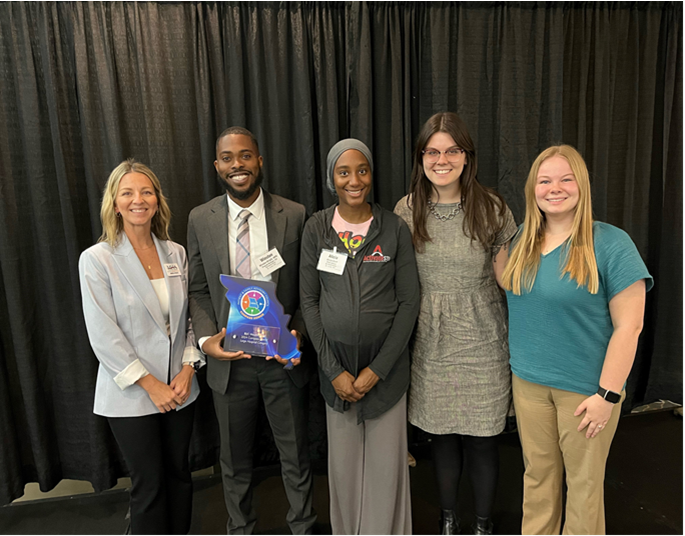
BJC HealthCare earned the Compass Honor as an organization with more than 100 beds.
The health system’s Sickle Cell Patient, Family, Community Advisory Council has helped guide improved care coordination systems for BJC’s sickle cell disease patients. The council offered feedback on proposed workflows, accessibility of space and design of the Sickle Cell Treatment Center at Barnes-Jewish Hospital — the first comprehensive adult treatment center for sickle cell disease in the St. Louis region.
“The Sickle Cell Patient, Family, Community Advisory Council has served as an integral part of the development of improved care coordination for sickle cell patients throughout BJC,” said Winston Wright, Program Manager of Diversity, Equity and Inclusion at BJC HealthCare. “Six of the seven members of the council volunteered their time over the course of a year to meet with hospital executives, physicians and other staff to share their experiences. As solutions began to be identified, we formed the council so that the members could have a formal role in strategic planning and operationalization.”
The council’s work has helped to normalize the needs of sickle cell patients at BJC, and the input that members offered have helped to begin closing gaps in care to this patient population.

St. Louis Children’s Hospital
It is an expectation at St. Louis Children’s Hospital that the patient and family voice is included at the table during any hospital strategic planning. Below are a few examples of how their PFCCC collaborated with leaders on several projects.
- implemented a weapons detection system, HID safe security/visitor system and visitor management guidelines
- implemented incident command centers and family communications for surges, behavioral health crises/surge and COVID-19 guidelines
- created a Small Baby Committee and “unit” in the NICU
- updated visitor guidelines and safe access
- developed standard work around family meetings/care conferences and family centered-care rounds
The most recent PFCCC initiative included standardization to the family meeting/care conference process. Having the opportunity to provide a more equitable communication process for families is one way the PFCCC impacts preventable harm outcomes and improves the quality of care in the hospital.
The leader of the PFCCC is a trained Diversity, Equity, Inclusion, Belonging (DEIB) advisor and facilitator. DEIB is baked into the new family partner orientation and continued learning throughout the year. Quarterly education with the council always is rooted in DEIB. The PFCCC is dedicated to ensuring that staff and volunteers continue to increase empathy ceilings for people whose stories and experiences are different than ours. It’s through DEIB work that the PFCCC truly provides trauma-informed, equity-based patient and family-centered care and share that voice.
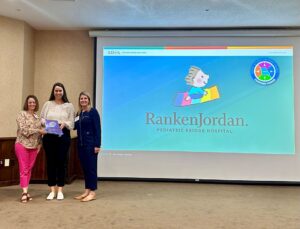
Ranken Jordan Pediatric Bridge Hospital
The PFAC partnered with the Patient and Family Experience Committee to respond to a reoccurring suggestion theme of uncomfortable sleeping arrangements for caregivers. Since the pull-out beds currently are new within the last few years, the hospital did not have the budget to replace them. In the meantime, the PFAC researched different overlay mattress options that could be provided to caregivers who are staying at the bedside. The council trialed several different options while also working with the infection prevention team to ensure these mattress overlays were able to be sanitized as needed. The PFAC asked current caregivers staying at the bedside to trial the options and provide their feedback. All Ranken Jordan caregivers now have the option to use a waffle mattress overlay for the pull-out bedside free of charge.
Recently, the PFAC began an initiative to empower all hospital employees to educate and invite Ranken Jordan caregivers to learn more and join the PFAC through business cards. Staff are educated on PFAC and its role within the hospital, as well as the qualities of caregivers/patients over age 16 that would make a great PFAC member.
Additionally, the PFAC offers quarterly updates in the hospital staff newsletter, hosts activities for staff to celebrate Patient Experience Week, hosts popup ‘coffee shop’ hours serving staff and current families while simultaneously educating on PFAC, and established a ‘Patient and Family Centered Care Champion Award’ which will be awarded twice annually beginning this November.
The PFAC provided feedback on several policies and guidelines during the COVID-19 pandemic to safely promote family and visitor presence within the hospital. The PFAC also successfully proposed the addition of the ‘Champions of Family Centered Care Award’ to honor those staff members who promote optimal care to both patients and their families, display the four core concepts of family-centered care, and utilize the PFAC in policy and initiative planning. The goal of this award is to not only honor staff but to simultaneously educate on the importance of PFAC and ways to utilize the PFAC.
In 2019, the council identified the need to provide a virtual meeting option so caregivers/patients outside of the greater St. Louis area can participate in meetings. The council has successfully held more than 50 virtual meetings.

We are proud to announce that the inaugural 2022 MHA Statewide PFAC Compass Honor is awarded to the PFAC of University Health.
University Health’s PFAC made several contributions to their organization. Below are a few examples.
- communication revisions improved billing practice strategies
- improvement charters now include the “voice of the patient” section
- physicians, residents, medical students, social workers, and nurses are educated on patient advocacy and respect for the patient voice in decision-making
- helped define exceptional patient experience
- installed cultural food equity and an on-site food pantry
- made accommodations to the discharge lounge
- developed a badge to recognize and support family caregivers
- revised its patient and visitor web page
- refined appointment reminder text messages
North Kansas City Hospital and University of Missouri Healthcare also received Honorable Mentions for their advanced efforts.
Resources
MHA’s Statewide PFAC presented a three-part webinar series to share effective strategies for building and enhancing your PFAC. The series builds on MHA’s previous Healing Happens Here Toolkit, which focuses on safety/security and workplace violence. Alternately, this series helps caregivers collaborate with patients and families by using evidence-based practices to improve the health care experience for all.
Each 45-minute session focuses on a highlighted topic and offers practical application of proven strategies to strengthen the relationship between the care team and the patient and family. Our Missouri PFE leaders are experts in their field and are available to mentor our hospital membership.
Part 1: Li Ern Chen, M.D., MSCS
Part 2: Tina Jones, MHA, CPXP
Director of Quality, Risk and Patient Experience | Golden Valley Memorial Healthcare
Part 3: Laurie Hines
Director at Missouri Kidney Program, University of Missouri-Columbia School of Medicine
Part 4: Martha Johnson
Manager of Patient Experience, Volunteer Services and Gift Shop, Boone Hospital Center
Parts 5 & 6: Denise Williams, R.N., BSN, CPPS, CPHQ
Director of Patient Safety, Mercy Health
- TED Talk: Leilani Schweitzer: How Can Hospitals Be More Transparent About Medical Errors?
- Cleveland Clinic’s Office of Caregiver Experience Improves Provider and Patient Outcomes
- JAMA – Resident Report: A Piece of My Mind
- National Healthcare Decisions Day flyer
- NPR Article: “For 2 Nurses, Working In The ICU Is ‘A Gift of a Job'”
Contact an expert
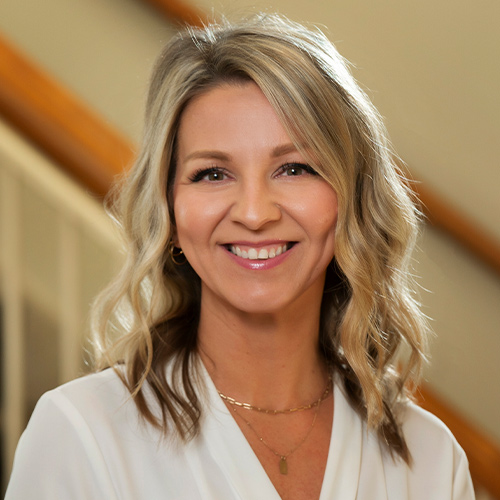
Sign Up
To begin receiving PFAC communications straight to your inbox, contact Jessica Stultz at jstultz@mhanet.com.
PFE Roadmap
MHA’s PFE roadmap supports engagement and achievement of 12 PFE metrics endorsed by CMS’ Partnership for Patients and adapted from the Michigan Keystone Center’s Patient and Family Engagement resource.
Media Library











